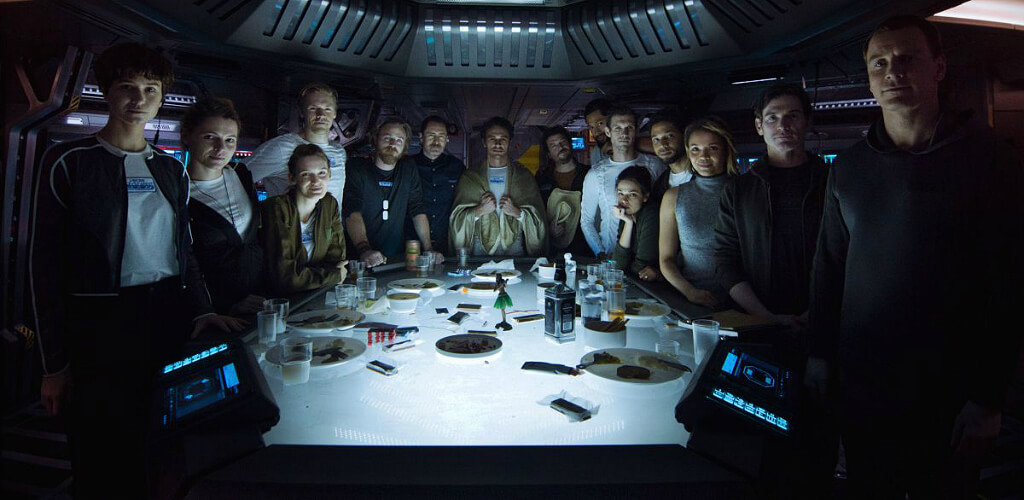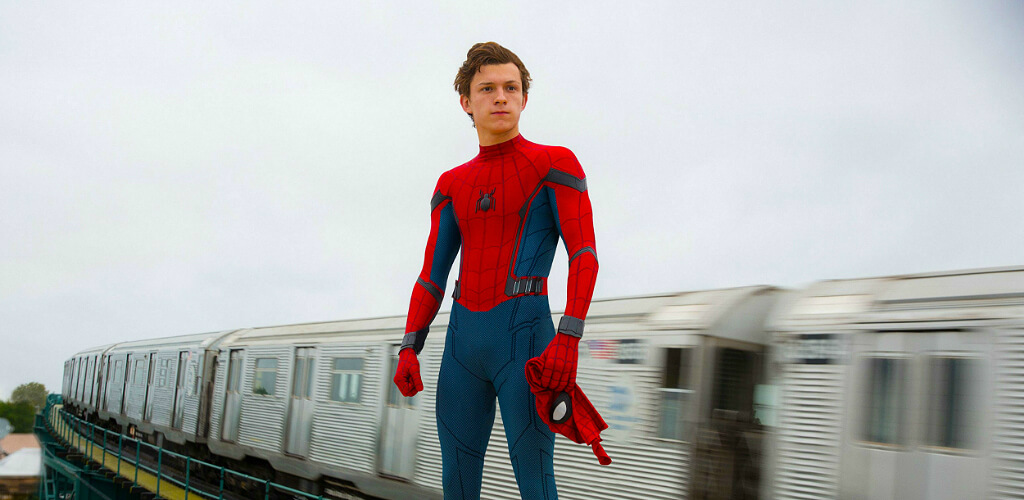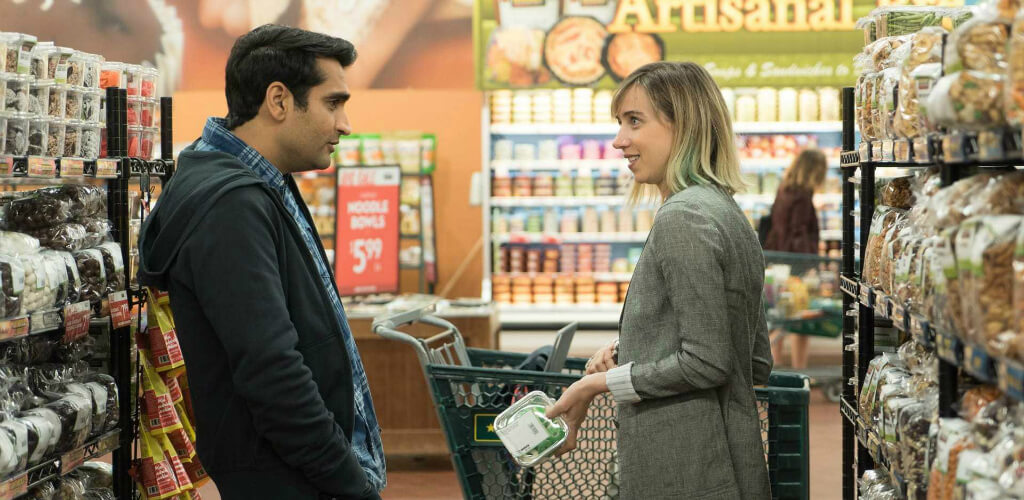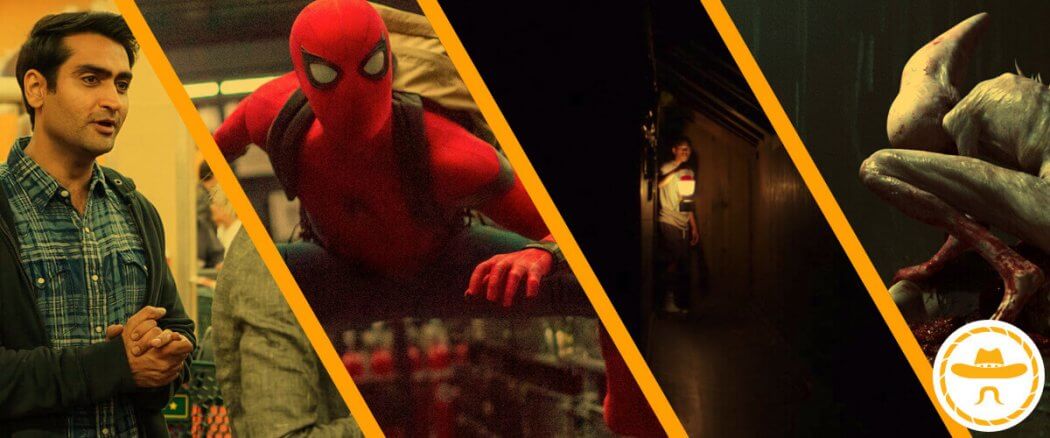At Cinema Faith, we wish we could provide feature-length reviews for every movie that hits theaters. Unfortunately, some films fall through the cracks. Welcome to another edition of Mini-Review Roundup where we present smaller reviews of several movies at once.
This month we review Alien: Covenant, Spiderman: Homecoming, It Comes at Night, and The Big Sick.
Alien: Covenant

What is it about the Alien franchise that draws us back every time? Certainly not inspirational stories of good triumphing over evil. The bets have always been off since Ridley Scott’s bleak original from 1979. Everyone is fair game in an Alien movie. Maybe that’s why we get sucked in, to watch a formidable foe at work. The revolting creature out there in deep space that exists solely to kill and reproduce — blood made of acid, jaws filled with two sets of razor sharp teeth, an organism birthed through violence. There’s something so primal and overwhelming about the alien itself. We return every time to see a new crew discover the horror; to watch them come up against the insurmountable in the hope that maybe this time humanity will find a way to overcome the darkness for good.
2012’s Prometheus was Ridley Scott’s return to the franchise and he took it in a wonderfully new direction, focusing more on philosophical questions of life and death than genre thrills. And for a while, Alien: Covenant follows suit. Directed once again by Scott and billed as a sequel to Promotheus, we start out with a connector scene that brilliantly captures the spirit of the former film. Then Scott switches gears completely. Off to another crew and a new synthetic robot with dubious intentions, played once again to perfection by Michael Fassbender. And surprisingly, the formula works all over again. We get to know these characters and watch in dread as they make the series of fateful decisions that lead them face to face with the alien we’ve come to see. There’s a new twist this time though. Initially, the alien blood reproduces in the form of an airborne virus which unleashes the film’s scariest and most effective moments.
But eventually, Scott brings us back to the world of Prometheus and that’s when things begin to fall apart. What began as smart, visceral sci-fi turns into a middle-brow slasher film with the alien hanging off the side of a spacecraft, stalking through hallways, and picking victims off one by one. This is part of the Alien package of course, but shame on Scott for teasing us with higher ambitions. I miss the explorations of faith and doubt, God and creation, that Prometheus started. This is a cold, cynical film by comparison. Prometheus ended with Elizabeth Shaw flying through space with a crucifix around her neck “still searching.” But faith is in short supply aboard the Covenant. Billy Crudup plays our self-described “man of faith” but he’s insecure and erratic, and his decisions get people killed.
Maybe Scott is simply reflecting the cynicism of our times. It’s hard to keep the faith when our institutions fail us and bigotry takes center stage. But keep the faith we must, no matter how overwhelming the foe or how fast it reproduces around us. One day evil will be silenced. Perhaps that’s what Scott is reminding us of in a roundabout way. After all, Covenant is still a prequel. Ripley is just around the corner, and we all know how that story ends.
Grade: B
Spiderman: Homecoming

The success of the Marvel Cinematic Universe can never be overstated. Since Iron Man in 2008, the films have grossed a collective $12 billion dollars worldwide. That’s more than the Harry Potter and Lord of the Rings movie franchises combined. But the money isn’t even the most remarkable part of the story. What the MCU deserves the highest credit for is the consistency of quality they’ve shown over the last nine years. We trust the Marvel brand because they never let us down. And trust was certainly required with their latest venture — Spiderman: Homecoming.
The Spiderman property has a long history on the silver screen. The trilogy with Tobey Maguire ended just a decade ago, only to be rebooted with Andrew Garfield in 2012. The sequel to that film came out in 2014. What new vision could Marvel possibly give to a character still fresh on our minds? Once again, the studio proves they know what they’re doing. Homecoming isn’t a reboot. In fact, it’s a movie made with the presumption that we’re already familiar with the character. The infamous “spider bite” that turns Peter Parker into a superhero is mentioned only in passing. We catch up with Spiderman long after his origin story. And director Jon Watts even plays on our memory of past films. At one point, Spiderman hangs upside down in front of his love interest and we’re instantly catapulted back to Tobey Maguire kissing Kirsten Dunst’s Mary Jane in the rain. Only this time, things don’t go according to plan.
Marvel makes another brilliant decision by casting Tom Holland in the lead role. For once, we get a Peter Parker that actually looks and feels like a high schooler. The Spiderman we encounter here is inexperienced and immature, and the movie is all the better for it. Peter got his first taste of being an Avenger on Captain America: Civil War and he now thinks high school is beneath him. Tony Stark (Robert Downey Jr.) functions as his makeshift mentor. Every encounter Peter has with Tony and Happy is comedy gold. We balk at first when they underestimate him, but eventually we understand. Peter has a lot of growing up to do. He’s placed all of his identity in Spiderman, but as Tony wisely tells him, “If you’re nothing without the suit, then you shouldn’t have it.” That’s an apt prescription for idolatry.
Another welcome casting choice is Michael Keaton as the villain Vulture. The role is steeped in irony since Keaton burst back on the scene in 2014 with Birdman, a story of a washed up actor famous for playing a bird-like superhero. Keaton straps on the wings in earnest this time and lends the character some working man heft. The only character that doesn’t work in Homecoming is Aunt May. Marissa Tomei never settles into her role and the entire performance feels off.
We can forgive Watts for his few blunders, though, because what he accomplishes with Homecoming is downright remarkable. He takes a character riddled with baggage and makes him feel brand new. He paces the film perfectly, deftly blending a coming of age story with all of the action we’ve grown accustomed to in a Marvel movie. He gets the most out of a fun, diverse cast. And he even manages to work in a twist late in the game that takes us by surprise and brings the entire movie to a head for the final act. Unsurprisingly, Watts has already been tapped for the sequel. But then again, we know who’s really behind the success of Homecoming. Every film in the MCU is executed by Marvel Studios first and foremost. This has caused contention with some directors used to having free reign over their films. But it’s difficult to argue against a formula that keeps producing films this good. In Marvel we trust.
Grade: B+
It Comes at Night

Whoever marketed It Comes at Night is a genius. First there’s the title, signifying something ominous that only comes at night. Then a trailer featuring zombie creatures, ghosts, and creepy villains. The movie itself has none of those things. Instead, Night is an indie about a pandemic that’s killed most of the world and a family doing everything they can to avoid getting sick. The plague doesn’t turn people into a zombie; it’s just a plague. That’s a fine premise on its own terms, but not what most were expecting going in. A cop-out ending doesn’t help. There were groans at the end of my screening, and some guy in the back row shouted that he wanted his money back.
That’s not to say Night is a terrible film. It’s just not the kind of horror movie we’ve come to expect. There are no jump scares, and all the fantastical elements from the trailer happen only in dreams. There are also long stretches where very little happens at all. In the end, this is a minimalist movie about human horror; the kind of horror we inflict on each other when we’re threatened and afraid.
A recent Time cover story declared “The World Is Not Ready for the Next Pandemic.” I believe it. Does the average person have the resources to survive for years on end if it’s not safe to go outside? How far would we be willing to go to protect our family? The second question becomes especially relevant as the events of the film unfold. Christians have deviated significantly from the Early Church on this subject. The idea of protecting your family at all costs was foreign to early Christians. They took Jesus’ command to love your neighbor seriously. When a plague swept through Rome, they didn’t flee. They stayed behind to care for the sick. When the Romans dragged whole families into the coliseums for sport, they didn’t fight back. They died loving their enemies, and that love turned Rome upside down.
Today, we just get our gun. Putting a bullet in a stranger’s head seems worth it to keep our family safe. We rarely stop to think if that stranger has a family of his own who would also like him safe. Love your neighbor? Absolutely, as long he’s nice and friendly. Love your enemy? Of course, as long as he doesn’t want to hurt us. But isn’t that the definition of an enemy?
Paul (Joel Edgerton) goes to great lengths to protect his family in Night. He crosses uncrossable lines, and we see the effect on his soul. The acting is effective all around, and director Trey Shults does a decent job exploring the questions he’s raised. But the movie feels small and underwhelming, and Shults misses an opportunity for a final payoff. Still, as a “what would you do?” horror show, Night works fine for a Saturday afternoon rental. Just lower your expectations accordingly.
Grade: B-
The Big Sick

You’ve probably laughed at Kumail Nanjiani before. He’s one of those actors that seems to have a bit part in everything. I don’t think he’d fault you for not remembering his name. Nanjiani is proud of where he came from, but he’s also aware that most people can’t find Pakistan on a map, let alone pronounce Nanjiani. He’s in on that joke, which is half the fun of The Big Sick — an autobiographical film that he co-wrote with his wife Emily based on their fanciful romance.
Nanjiani (playing himself) and Emily (played by Zoe Kazan) meet each other across a deep cultural divide. Nanjiani’s parents are devout Muslims who believe in arranged marriage. His mom has a new suitor every week, but Nanjiani wants to forge his own path. If he does, though, he’ll be cut off from his family for life. This stretches his relationship with Emily to the breaking point. That’s enough material for a film right there, but this true story romance has another twist. When Emily contracts an undiagnosed illness, her doctors put her in a medically induced coma. Nanjiani sits in limbo by Emily’s bedside and soon forms an unlikely relationship with her parents. Only here does Nanjiani begin to figure out who he is and what he really wants.
Nanjiani is a master at deadpan comedy, but The Big Sick shows a side of him we’ve never seen before. I don’t foresee him winning an Oscar someday, but he does prove he can headline a movie with all the appropriate emotional notes. But The Big Sick has an even bigger trick up its sleeve — Ray Romano and Holly Hunter as Emily’s parents. The two of them nearly walk away with the movie. Romano, in particular, has never been better. He’s funny of course, but also touching and real.
This cuts to the heart of the movie’s strengths. Nothing about The Big Sick feels artificial. There are no Hollywood shortcuts. Every turn feels earned. Feel free to go into the film expecting laughs. You won’t be disappointed. But these are laughs rooted in the bumps and bruises of actual life.
The Big Sick could have been tighter and grander in execution, but the down to earth messiness is part of its charm. The movie is as authentic as its real life inspiration. This is Nanjiani properly introducing himself to us after years of cameos. We learn about his culture, his struggles, his dreams and failures. And that time he fell in love with a girl in a coma and finally woke up.
Grade: B+





